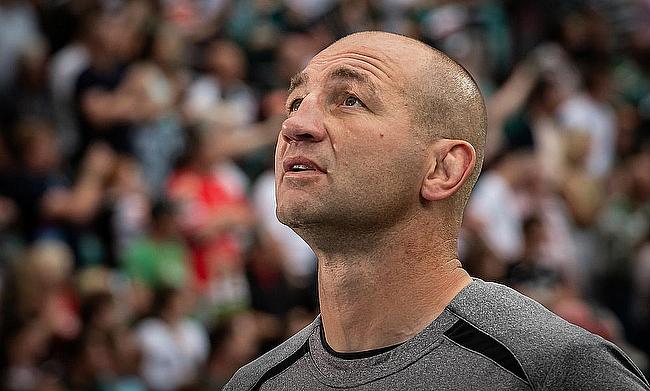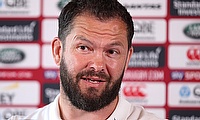England’s ugly performance frustrated their supporters but the bottom line is Borthwick’s side are title contenders

It was far from pretty against Scotland but Steve Borthwick's side managed to get the job done
©David Howlett
As the Six Nations breaks for another fallow week, there are no hard luck stories for England to be dwelling on.
After a run of results in the autumn where Steve Borthwick’s side came agonisingly close to victory on multiple occasions, England have now found a way to come out on top.
After dramatically edging past France two weeks ago, England wrestled back the Calcutta Cup for the first time in five years on Saturday, narrowly beating Scotland 16-15.
So, what did we learn from the weekend and can England really go all the way in this tournament?
England looked clunky but winning this way is better than playing well and losing
Sometimes in Test rugby, knowing how to close out tight games can be just as important as any other strategy.
In the autumn, it was a couple of late missed kicks against New Zealand and a last-minute try in the Australia game that denied Borthwick’s side victories.
However, the tide seems to have turned in this Six Nations with England falling on the right side of the results.
On Saturday, the thousands that poured out of Allianz Stadium, Twickenham may have questioned whether this was truly a game that England won or one that Scotland lost.
There seemed an aura of inevitability as Duhan Van der Merwe, England’s tormenter in the Calcutta Cup over the past few years, went over for a try that seemingly sealed the game.
However, the missed conversion by Finn Russell had an eerily similar feel to George Ford’s against New Zealand back in November.
Test matches often come down to the finest of margins, and despite the slightly ugly performance from England, they took their chances when they were on offer and ultimately took the victory.
Speaking on the tight result, England head coach Steve Borthwick said: “I think certainly at Allianz Stadium, most recently, the endings to games have been pretty tight and pretty dramatic.
“Obviously, delighted in the last two games that the endings have gone our way, and the team worked exceptionally hard for that.
“In many ways, it wasn't pretty, and there were things we'd obviously want to do differently, do better but ultimately they found a way to win the game.
Captain Maro Itoje added: “From our point of view, we're delighted to get the win. The boys fought hard. It wasn't necessarily pretty. It probably didn't go all our way.
“They threw a whole load of difficult questions and scenarios at us, and I'm just very proud that the boys stuck in there and we found a way to win.”
Arguably, England have already faced their most significant challenges in the competition, and with two games left, that they should win on paper [against Italy and Wales], against all the odds, they remain very much in contention for the championship.
What’s the game plan?
History will only remember that England managed to win this game. However, at present, pressure remains on Borthwick about their style of play.
Ever since the World Cup, we have been promised expansive attacking rugby by Borthwick and his squad however Saturday’s performance was far from that.
“A real tactical arm wrestle the way Scotland set that up and immense credit to them, but very difficult to play against,” Borthwick said at full-time. “They've got a strong defence, and that causes your problems in the contact area.”
England made less than half the post-contact metres that Scotland did, with only 158 in comparison to the visitors’ 334. Scotland also made nine line breaks to England’s two. They were the team with more ambition, more ideas.
Compare this to when they played France, England were much more fluid in attack making 247 post-contact metres and eight line breaks.
All the stats start to make sense when you consider the boos that rang around the Allianz Stadium, Twickenham when Alex Mitchell put up yet another box-kick in the 48th minute on an afternoon where England’s kicking from hand was questionable in moments.
Perhaps the boos were unwarranted, and despite the ugly fashion, England took their chances and saw out a game that, three months ago, they would have lost.
Fin Smith: The future at 10
With 10 minutes left on the clock, penalty awarded on the halfway line, opportunity to take the lead to six points.
Up steps Fin Smith.
Marcus Smith had kicked until that point in the game, and even with long-range kicking expert Elliot Daly on the field, F.Smith took it upon himself in the ultimate pressure moment to slot the kick and give England what turned out to be the winning points.
Much has been debated about the Smith squared experiment, but there’s no denying that in two Test starts, the Northampton fly-half has helped England see out two tight matches.
Perhaps most impressively, it was Smith’s defensive performance that shone through, putting in an immense 16 tackles, the second most of any player on the pitch, including the dominant hit on Tom Jordan that gave England another penalty.
Whilst it wasn’t the attacking performance of the century for England, Smith is proving why sticking with this experiment for the rest of the tournament may just start to pay dividends for Borthwick’s side.
Defensive disaster or masterclass?
Three tries to one, yet England still won the game.
The mood in the stadium dropped like a lead balloon when Ben White went over for Scotland’s opener in the fourth minute, which is a scenario England fans have seen far too many times in the wide channels.
England’s ultra-aggressive blitz defence from the autumn has been dropped for a slightly more passive and cohesive system, but Scotland were able to exploit it with ease by working the ball out to the edges.
It happened again less than 20 minutes later, with a quick lineout taken with no jumper, a tactic Scotland used no less than three times in order to catch the English defence unaware.
However, despite leaking these kinds of tries, on the whole, the defensive performance was one England can be proud of.
Borthwick explained: “I think that there's a whole lot of positives from the defensive effort. I think Maro alluded to the character the team showed in the scramble.
“They ran hard for each other. I think that shows, as a character and a core, how much these players really care, and we want to build on it now.
“Clearly, Scotland were still able to move the ball to the edge and score, and we need to continue developing how we can prevent that from happening.”
“As a team, we want to take pride in our defence” Itoje added.
“If you have a good defence, you put yourself in a position to win the game. Today was good, it wasn't perfect. We still leaked some tries, but the fight, the character and the energy that the boys kept on showing was really good.”
Scotland dominated possession, meaning the defensive effort from England was ginormous, with 206 tackles in total.
It was perhaps best encapsulated around the 58th-minute mark, where a half-break by Finn Russell brought Scotland within metres of the England try line.
However, the defensive line from England remained cohesive and disciplined and kept knocking the Scottish carriers back in brutal fashion. Eventually, after being pushed all the way to the 22, Itoje won the turnover and Scotland head coach Gregor Townsend was full of praise for how England repelled his side.
“I thought they defended really well in their 22, and I thought they kept their discipline often. When you get into 22, you often manage to get a penalty for offside. We didn't get that and I thought they were really strong close to the ruck, so credit goes to them.”
England now have another fallow week to regroup before the Azzurri come to town. With the extra preparation time, Borthwick will surely be looking to fix up those defensive decisions in the wide channels otherwise the threat of the Italian wingers will be a real danger.
Back-to-back wins for the first time in 12 months for England then, and a third against Italy on March 9th will keep them in the title conversation.









